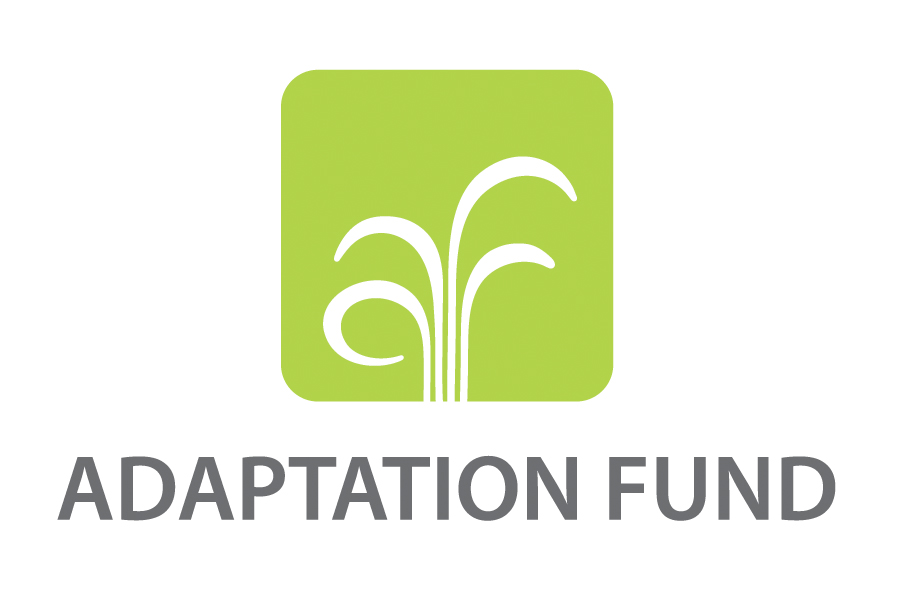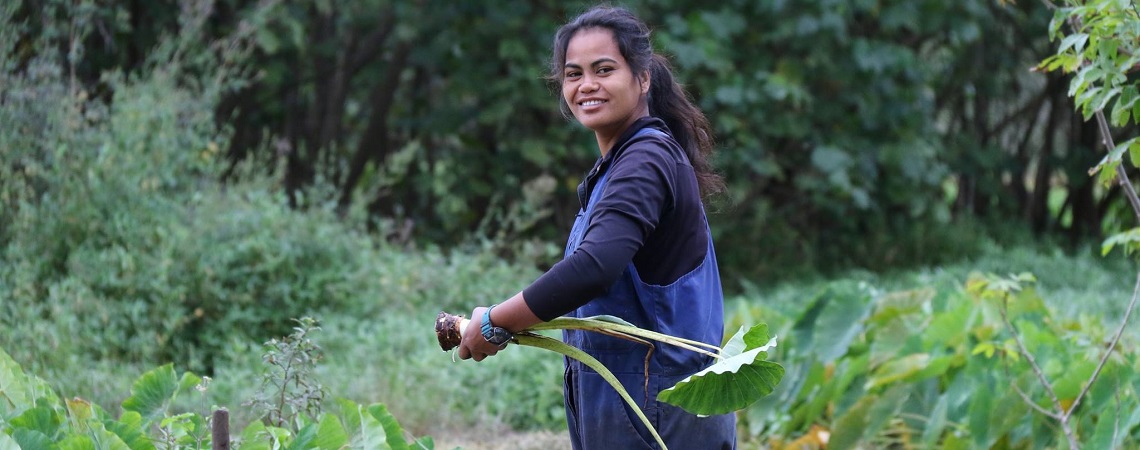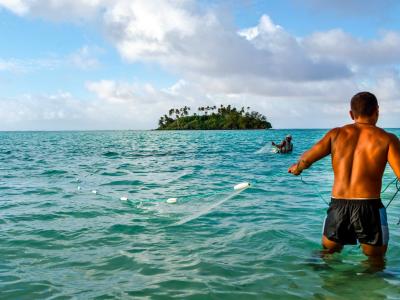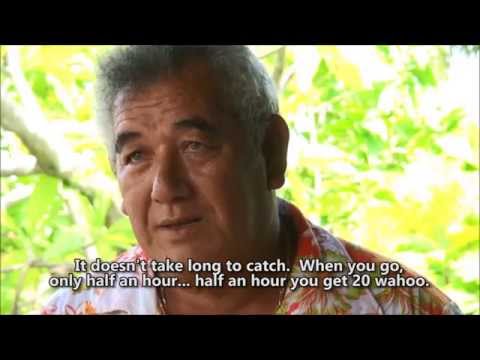Photo:
The Cook Islands is subject to highly destructive cyclones, intense rainfall events, and devastating droughts. The isolated populations in the Pa Enua (sister islands to the capital island of Rarotonga) are especially vulnerable to the anticipated changes in climate, including increased frequency and intensity of rainfall and tropical storms; rising and extreme sea levels and changing wind patterns; and hotter, drier weather.
The objective of this project (2012 - 2018) was to strengthen the ability of all Cook Island communities, and the public service, to make informed decisions and manage anticipated climate change driven pressures (including extreme events) in a pro-active, integrated and strategic manner.
Project details
Levels of intervention
- National
Source of funds
- Adaptation Fund
Key implementers
- Local Governments
- National Governments
Funding amounts
Project partners
- Central Policy and Planning Unit, Office of the PM, Cook Islands
- United Nations Development Programme (UNDP)
- Adaptation Fund
Introduction
The Cook Islands is subject to highly destructive cyclones, intense rainfall events, and devastating droughts. The isolated populations in the Pa Enua (sister islands to the capital island of Rarotonga) are especially vulnerable to the anticipated changes in climate, including increased frequency and intensity of rainfall and tropical storms; rising and extreme sea levels and changing wind patterns; and hotter, drier weather.
The objective of this project (2012 - 2018) was to strengthen the ability of all Cook Island communities, and the public service, to make informed decisions and manage anticipated climate change driven pressures (including extreme events) in a pro-active, integrated and strategic manner.



Project details
The programme "Strengthening the Resilience of our Islands and our Communities to Climate Change (SRIC - CC)"sought to strengthen the ability of all Cook Island communities, and the public service, to make informed decisions and manage anticipated climate change driven pressures (including extreme events) in a pro- active, integrated and strategic manner. In achieving this objective, the programme supported, at the national, sectoral, and island levels, implementation of the Cook Islands' new National Adaptation Plan for Disaster Risk Management and Climate Change Adaptation.
The programme had a 3-pronged approach, ultimately focusing on the implementation of on-the ground adaptation and disaster risk reduction measures at the community level in the Pa Enua. This was integrated with sustainable island capacity building and wider development processes, and supported through enhanced national policy, institutional and knowledge management capacities.
Through implementation of integrated and climate-resilient island development plans targeting all 11 inhabited island of the Pa Enua, and at least 2000 households and over 100 enterprises in the Pa Enua, it was aimed at:
- National level - strengthening policy and institutional capacity and public awareness on climate change and disaster risk reduction, through conducting and updating climate risk assessments, enhancing climate early warning systems tailored to vulnerable sectors, training policy makers and technicians in the relevant government departments;
- Pa Enua - increasing the adaptive capacity of households and businesses and affected sectors, such as agriculture, water supply, tourism, health, fisheries, coastal management, and enhancing the adaptive capacity of local communities through engagement in island level CCA-DRM planning process linked with Island Development Plans and the National Joint Action Plan, and targeted training and awareness-raising activities using different media;
- Pa Enua - strengthening livelihoods through diversifying food production, processing and related subsistence and income-earning activities amongst local communities, improving protection of household and business assets, reducing the risks of disease and death associated with climate-related extreme events, and enhancing the resilience of terrestrial, coastal and marine ecosystems on which the communities, businesses and sectors depend.
- National
- Local Governments
- National Governments
Farmers; Fishers; Tourism Operators; Island Communities
- Central Policy and Planning Unit, Office of the PM, Cook Islands
- United Nations Development Programme (UNDP)
- Adaptation Fund
News
Moving with the times by Climate Adaptation UNDP on Exposure
'Building resilience on Aitutaki', Cook Islands News, May 16 2018. Arun Rijal and Melina Tuiravakai from Climate Change Cook Islands have just returned from Aitutaki where they visited farms, coastal areas, and nurseries to monitor progress being made on the project 'Strengthening the Resilience of our Islands and our Communities to Climate Change. Over the past five years, the project has worked to strengthen the ability of islands and communities in the outer islands to manage the anticipated consequences of climate change.
A Farming Family Affair by Climate Adaptation UNDP on Exposure
Key results & output
Component 1: Strengthening/Implementing climate change adaptation (CCCA) and disaster risk reduction (DRR) at national level
National staff trained to improve delivery of CCA and DRM initiatives (Output 1.1) in order to integrate CCA and DRM into policies, related instruments, and work programmes (Output 1.2), including the development of fully operational climate early warning and information systems (Output 1.3).
Component 2: Strengthening capacities for CCA and DRR in the Pa Enua
Harmonize CCA and DRR actions with island development plans (Output 2.1) and train key island stakeholders for planning and undertaking these initiatives (Output 2.2).
Component 3: Implementing CCA and DRR measures in the Pa Enua
Distribute small grants to all 11 Pa Enua and communities to implement CCA and DRR measures at island level (Output 3.1). Implement climate-resilient agricultural and fisheries practices in at least 5 islands (Output 3.2); enhance water capture/storage/management in at least 7 islands (Output 3.3); enhance coastal protection in at least 3 islands (Output 3.4); improve resilience of tourism enterprises in at least 3 islands (Output 3.5); introduce health support and vector-borne disease control techniques in at least 5 islands (Output 3.6); and implement infrastructure projects(Output 3.7).
Component 4: Climate change adaptation knowledge management
Share lessons learned and best practices with local and international communities through case studies, media, and school programmes and curricula.
As detailed in the Adaptation Fund Proposal - Cook Islands - resubmission Oct 2011
Reports & publications
Reports and Publications by country teams
Quarterly Updates
Programme Related Events
Document
Board Meeting Reports
Project documents
PIFs
Videos & multimedia
Monitoring & evaluation
Project monitoring and evaluation (M&E) will be in accordance with established UNDP procedures and will carried out by the Project team, verified by the OPM and the UNDP Country Office in Samoa. Dedicated support by the technical adaptation teams in the UNDP Asia-Pacific Regional Centre and UNDP New York will be provided on a regular basis. The Results Framework of the project defines success indicators for project implementation as well as the respective means of verification. A Monitoring and Evaluation (M&E) system for the project will be established, based on these indicators and means of verification. The indicators, targets and means of verification provided in the proposal to the Adaptation Fund will be reconfirmed during the inception phase of the project. Any changes to the Results Framework require approval by the Project Board.
A Project Inception Workshop will be conducted within four months of project start up with the full project team, relevant government counterparts, national stakeholders, partners, and UNDP. The Inception Workshop is crucial to building ownership for project results and to plan the first year annual work plan. A fundamental objective of the Inception Workshop will be to present the modalities of project implementation and execution, document mutual agreement for the proposed executive arrangements amongst stakeholders, and assist the project team to understand and take ownership of the project’s goals and objectives. Another key objective of the Inception Workshop is to introduce the project team which will support the project during its implementation. An Inception Workshop Report will be prepared and shared with participants to formalize various agreements decided during the meeting.
A UNDP risk log will be regularly updated in intervals of no less than every six months in which critical risks to the project have been identified. Quarterly Progress Reports will be prepared by the Project team and verified by the Project Board. Annual Project Reports will be prepared to monitor progress made since project start and in particular for the previous reporting period. These annual reports include, but are not limited to, reporting on the following:
- Progress made toward project objective and project outcomes - each with indicators, baseline data and end-of-project targets (cumulative);
- Project outputs delivered per project Outcome (annual);
- Lessons learned/good practices;
- Annual expenditure reports;
- Reporting on project risk management.
Government authorities, members of the Project Board and UNDP staff will conduct regular field visits to project sites based on the agreed schedule in the project's Inception Report/Annual Work Plan to assess first hand project progress.
In terms of financial monitoring, the project team will provide UNDP with certified periodic financial statements. The Audit will be conducted in accordance with UNDP Financial Regulations and Rules and applicable audit policies on UNDP projects by a legally recognized auditor of the Government, or by a commercial auditor engaged by the Government. During project implementation, Annual Work Plans (AWPs) and Quarterly Work Plans (QWPs) will be used to refine project delivery targets and realign project work upon consultation and endorsement by the Project Board.
The project will undergo an independent Mid-Term Evaluation (MTE) at the mid-point of project implementation, which will determine progress being made toward the achievement of outcomes and identify course correction if needed. It will focus on the effectiveness, efficiency and timeliness of project implementation; highlight issues requiring decisions and actions; and present initial lessons learned about project design, implementation and management. Findings of this review will be incorporated as recommendations for the final half of the project’s term. A summative terminal evaluation will be conducted 3 months before project closure.
Newsfeed
Contacts
- UNDPShoko TakemotoRegional Technical Advisor



